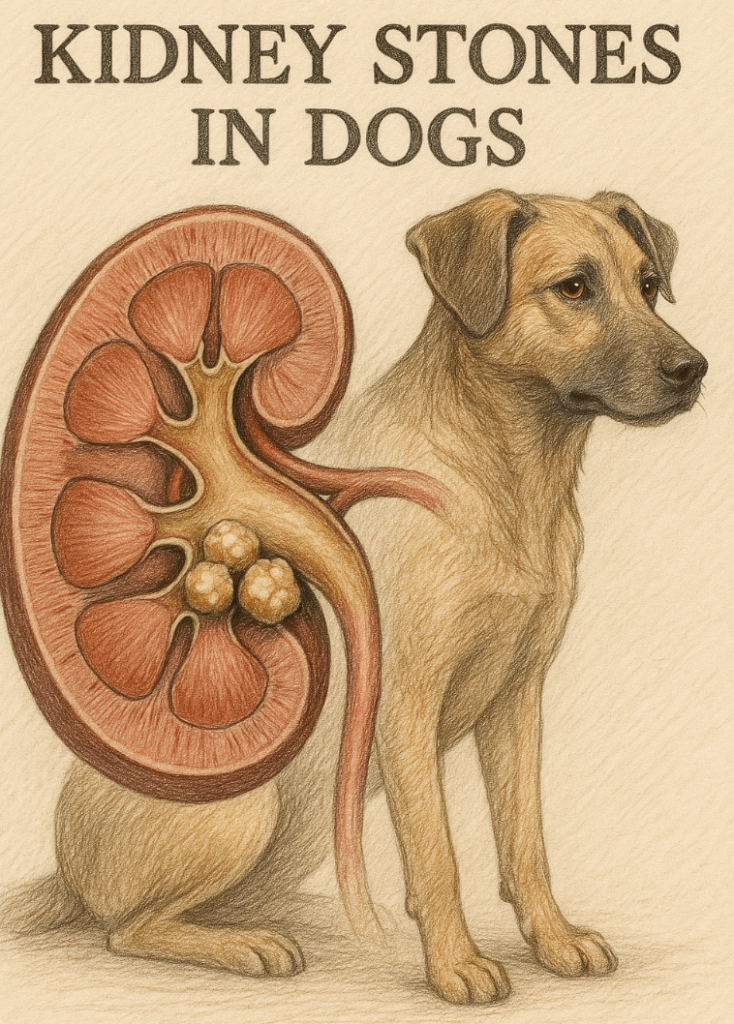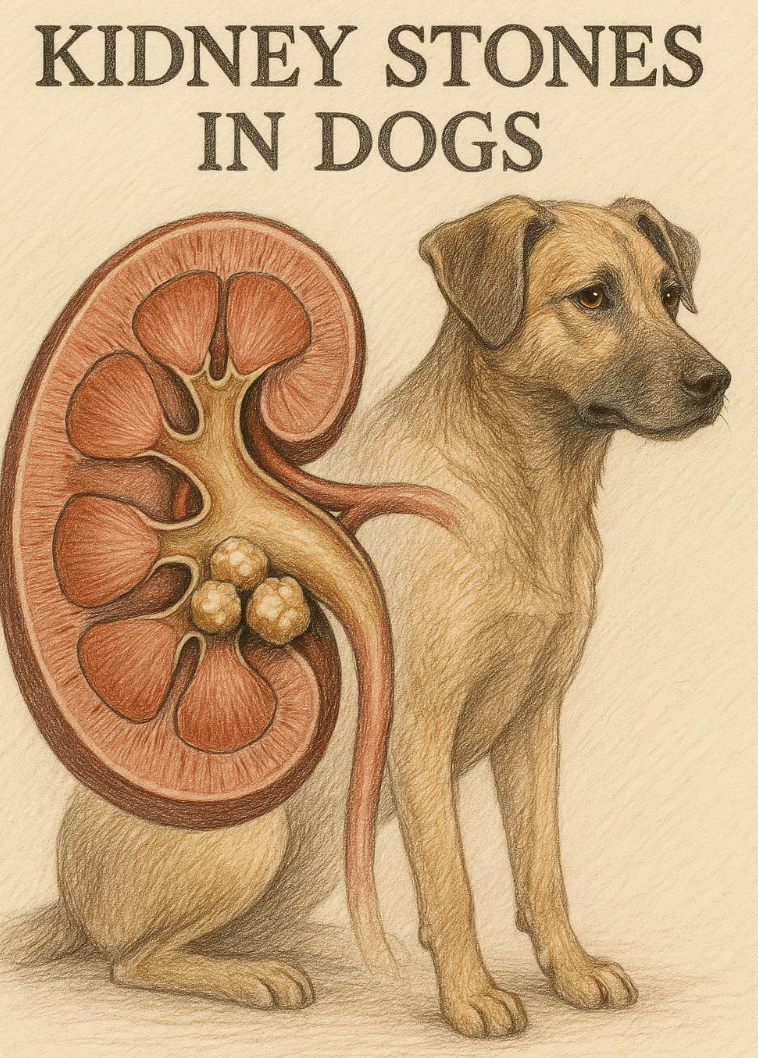Kidney Stones in Dogs: What Every Pet Owner Should Know
Kidney stones, also known as nephrolithiasis, are a condition that can affect dogs of all breeds and ages. These mineral deposits form in the kidneys and, if left untreated, can lead to discomfort, infection, or even severe health complications. While not all kidney stones cause symptoms, they can significantly impact your dog’s quality of life when they do. Understanding the causes, symptoms, and treatment options for kidney stones is essential for ensuring your furry friend stays healthy and happy. In this blog post, we’ll explore everything you need to know about kidney stones in dogs, from prevention strategies to expert care tips.
Common Causes of Kidney Stones in Dogs
Kidney stones in dogs develop due to a combination of dietary, genetic, and environmental factors. Identifying the root cause is crucial for effective management and prevention.
Dietary Imbalances:
High levels of certain minerals like calcium, phosphorus, or magnesium in your dog’s diet can contribute to stone formation.Dehydration:
Insufficient water intake leads to concentrated urine, creating an environment where minerals crystallize and form stones.Genetic Predisposition:
Some breeds, such as Dalmatians, Yorkshire Terriers, and Shih Tzus, are more prone to developing kidney stones due to their genetic makeup.Urinary Tract Infections (UTIs):
Chronic UTIs can alter the pH of urine, promoting the growth of specific types of kidney stones.Underlying Health Conditions:
Diseases like Cushing’s syndrome or hyperparathyroidism can increase the risk of stone formation by affecting mineral metabolism.
Understanding these causes helps pet owners take proactive steps to minimize the risk of kidney stones in their dogs.
Signs and Symptoms of Kidney Stones in Dogs
Detecting kidney stones early is vital for preventing complications. Here are some common signs that may indicate your dog is suffering from this condition.
Frequent Urination:
Your dog may attempt to urinate more often than usual but produce little to no urine.Blood in Urine:
Hematuria, or blood in the urine, is a telltale sign of kidney stones or urinary tract issues.Straining to Urinate:
Dogs with kidney stones often appear uncomfortable or in pain while trying to urinate.Lethargy and Loss of Appetite:
Discomfort and potential infections can cause your dog to become less active and refuse food.Abdominal Pain or Discomfort:
Your dog may exhibit signs of pain, such as whimpering or reluctance to be touched around the abdomen.
Recognizing these symptoms early allows for prompt veterinary intervention, improving your dog’s chances of recovery.
Check this guide 👉Dog Kidney Disease Diet: Best 7 Expert Tips!
Check this guide 👉Caring for a Dog in the Last Days of Kidney Failure: Best 7 Tips

Prevention Tips for Kidney Stones | Treatment Options for Kidney Stones |
|---|---|
Provide plenty of fresh water daily | Medications to dissolve certain types of stones |
Feed a balanced, veterinarian-approved diet | Surgical removal for large or obstructive stones |
Monitor urinary pH through regular check-ups | Antibiotics to treat accompanying infections |
Avoid excessive protein or mineral-rich foods | Dietary adjustments to prevent recurrence |
Encourage frequent bathroom breaks | Ultrasonic lithotripsy to break up stones |
Diagnosis of Kidney Stones in Dogs
If you suspect your dog has kidney stones, a veterinarian will conduct a series of tests to confirm the diagnosis and determine the best course of action.
Physical Examination:
The vet will palpate your dog’s abdomen to check for any abnormalities or signs of pain.Urine Analysis:
A urinalysis helps identify crystals, blood, or bacteria in the urine, indicating the presence of stones.Blood Tests:
Blood work assesses kidney function and detects any underlying conditions contributing to stone formation.Imaging Techniques:
X-rays or ultrasounds provide detailed images of the kidneys and urinary tract to locate and evaluate the size of the stones.Stone Composition Testing:
If stones are passed or removed, analyzing their composition helps tailor prevention strategies moving forward.
Accurate diagnosis ensures targeted treatment, improving your dog’s prognosis and reducing the likelihood of recurrence.
Preventing Recurrence of Kidney Stones
Once your dog has been treated for kidney stones, taking preventive measures is essential to avoid future episodes.
Maintain Proper Hydration:
Ensure your dog always has access to clean, fresh water to dilute their urine and reduce mineral concentration.Follow a Specialized Diet:
Veterinarian-prescribed diets formulated for stone prevention can help manage mineral levels in your dog’s system.Regular Veterinary Check-Ups:
Routine monitoring allows for early detection of any changes in your dog’s urinary health.Encourage Frequent Exercise:
Physical activity promotes overall health and aids in maintaining a healthy urinary system.Monitor Urine pH Levels:
Keeping track of your dog’s urine pH helps prevent the formation of specific types of stones.
By implementing these strategies, you can significantly lower the risk of kidney stones recurring in your dog.
Types of Kidney Stones in Dogs
Kidney stones come in various forms, each requiring specific approaches for treatment and prevention. Understanding the different types helps tailor care plans effectively.
Calcium Oxalate Stones:
Common in certain breeds, these stones form in acidic urine and often require surgical removal.Struvite Stones:
Associated with urinary tract infections, these stones can sometimes be dissolved with medication.Urate Stones:
Often seen in Dalmatians, these stones result from abnormal uric acid metabolism and require dietary changes.Cystine Stones:
Rare and linked to genetic disorders, these stones demand lifelong management and specialized diets.Silicate Stones:
Caused by high silica intake, these stones are challenging to dissolve and typically require surgery.
Knowing the type of stone your dog has ensures targeted and effective treatment.
Home Remedies and Supportive Care for Dogs with Kidney Stones
While professional veterinary care is essential, there are supportive measures you can take at home to aid your dog’s recovery and comfort.
Increase Water Intake:
Add water to your dog’s food or use a pet water fountain to encourage drinking.Provide Warm Compresses:
Applying warmth to the abdomen can alleviate pain and discomfort caused by kidney stones.Limit Stressful Situations:
Reducing stress helps maintain urinary health and prevents flare-ups.Offer Gentle Exercise:
Light walks or playtime promote circulation and overall well-being without overexertion.Track Symptoms Daily:
Keep a journal of your dog’s behavior, appetite, and urination patterns to share with your vet.
These supportive practices complement professional treatment and enhance your dog’s quality of life.
The Role of Genetics in Kidney Stone Formation
Genetics plays a significant role in determining a dog’s susceptibility to kidney stones. Understanding breed-specific risks can help owners take preventive action.
Dalmatians and Urate Stones:
Dalmatians are genetically predisposed to forming urate stones due to their unique liver enzyme deficiency.Yorkshire Terriers and Calcium Oxalate Stones:
This small breed is prone to calcium oxalate stones, which often require surgical intervention.Shih Tzus and Struvite Stones:
Shih Tzus frequently develop struvite stones, often linked to chronic urinary tract infections.Basset Hounds and Cystine Stones:
Basset Hounds are one of the few breeds susceptible to cystine stones, requiring lifelong dietary management.Mixed-Breed Dogs:
Even mixed-breed dogs can inherit genetic traits that increase their risk of kidney stones, making regular vet visits essential.
Awareness of genetic predispositions empowers owners to take proactive steps in safeguarding their dog’s urinary health.
Frequently Asked Questions About Kidney Stones in Dogs
Are kidney stones painful for dogs?
Yes, kidney stones can cause significant discomfort, especially during urination or if they lead to blockages.
Can diet alone prevent kidney stones?
While diet plays a crucial role, other factors like hydration and genetics also influence stone formation.
What breeds are most prone to kidney stones?
Breeds like Dalmatians, Yorkshire Terriers, and Shih Tzus have a higher predisposition to developing kidney stones.
How long does treatment take?
Treatment duration varies depending on the severity of the condition and the chosen method, ranging from weeks to months.
Can kidney stones be fatal?
If left untreated, kidney stones can lead to life-threatening complications like kidney failure or sepsis.
Empowering Pet Owners to Manage Kidney Stones in Dogs
Kidney stones in dogs may seem daunting, but with the right knowledge and proactive care, you can ensure your furry companion leads a healthy, comfortable life. From understanding the causes and recognizing symptoms to exploring treatment options and prevention strategies, every step you take contributes to your dog’s well-being. Remember, your veterinarian is your greatest ally in managing this condition—never hesitate to seek professional guidance. By staying informed and attentive, you can protect your dog from the discomfort and risks associated with kidney stones, fostering a happier, healthier bond between you and your beloved pet.
Do Cats Have Taste Buds? Best 7 Expert Tips! – Discover how cats experience flavors and why their taste is so unique.
Do Dogs Have Taste Buds? Best 7 Expert Tips! – Discover how dogs experience taste, their preferences, and what it means for their diet and health.
Can Cats Taste Sweet? Best 7 Expert Tips! – Discover why cats can’t taste sweetness, how it affects their diet, and tips to keep them healthy and happy.
Can Dogs Taste Sweet? Best 7 Expert Tips! – Discover how dogs perceive sweetness, which foods are safe, and tips to manage their sweet cravings responsibly.





